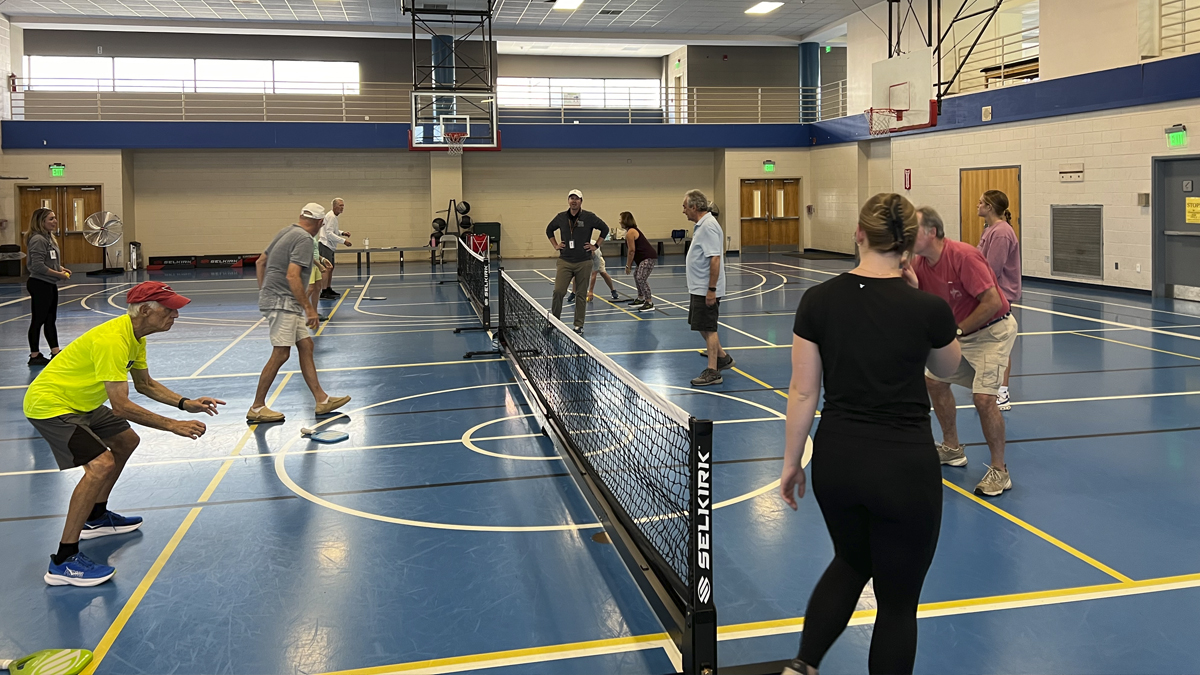It doesn’t take long to discover when a good thing should keep going – just ask the team of experts at the Medical University of South Carolina Wellness Center. During the earliest weeks of a pilot pickleball program called Pick It Up for Parkinson’s, all signs signaled success.
“I was nervous about the program,” confirmed Cindi Day, a certified trainer who coaches and who helped develop Pick It Up. “Despite rigorous assessments of each participant to confirm there is no high fall risk, I didn’t want anyone to get hurt.”
Her concerns quickly abated.
“We were able to break down specific movements to maintain balance and other skills first,” she said. “The nine participants mastered those skills and had fun. By the second week, their competitive spirits came alive. If you miss the ball four times, you are going to care.”
The eight-week instructional program, developed by exercise professionals and movement disorders specialists, teaches people with Parkinson’s disease many techniques and strategies to play pickleball safely. Day is quick to note that Pick It Up’s success is linked to many partners, including MUSC’s Movement Disorders Program staff members Dr. Vanessa Hinson, Nicole Cool, BSN, RN, and Kevin Smuniewski MEd, director of student wellness programs.
“I didn’t know how to play pickleball, and Kevin taught me everything there is to know about it,” said Day.
“Pickleball is the fastest growing sport in the country, and it’s easy to see why,” Smuniewski said. “It’s a very easy sport to pick up for a variety of populations, and it’s a very social game in nature, allowing players to interact with one another throughout the game. I think the participants in Pick It Up are going to enjoy this program immensely and benefit from the game’s outcomes.”
Pick It Up for Parkinson’s earned a national shout-out during the fall when a filming crew from Public Broadcasting Service captured a few local Parkinson’s patients demonstrating their pickleball skills for its show “Viewpoint,” starring Dennis Quaid.
“It was an exciting opportunity to introduce more people to programs that help individuals suffering from movement disorders,” said Day. “More people can now discover that exercise is medicine.”
For Day, the national exposure was rewarding, but her biggest thrill is seeing how the skills that prepare participants for pickleball improve their lives at home and in the community as well.
“We learn about someone who is struggling to move from one counter in the kitchen to the microwave, so we set up drills with what looks like countertops, and people practice from one to the next,” Day said. “It is so rewarding to hear a participant say, ‘I’m not falling anymore; I can go from one to the other at home.’”
If someone mentions having trouble getting out of bed, Day and her team will add another element to the class: “When people function better – they can step over something without tripping, and they have more confidence – that is the biggest reward.”
Behind every effective venture is a behind-the-scenes person who keeps the instructional packets, promotions and program assessments rolling. For Pick It Up, Chrissie Wojciechowski is that powerhouse.
“I jump in when I can help because the impact of the program is amazing,” said Wojciechowski, who also coaches. “Seeing participants’ eyes light up – seeing them practice movements taught on the court in their daily life – is what I enjoy the most.”
Some of the movements taught during Pick It Up focus on side-to-side movements – lateral lunges, for example – and skills that engage the core, Wojciechowski explained.
Together, Wojciechowski and Day continually think of ways to fill the gap between what providers tell patients they need to do for better health and how patients then move forward.
“We want to be there for people so that they can ease right from their doctors into a health and wellness plan,” Day explained.
The duo launched Rock Steady Boxing in 2017, a noncontact boxing-based exercise program for people with Parkinson’s disease. The boxing and pickleball programs teach overlapping skills – hand/eye coordination and balance, for example. Pick It Up takes those skills to another level.
“Rock Steady offers individual training, and the pickleball program does the same and then moves the skills up a notch,” Day explained. “Participants go from practicing balance to balance and hitting a ball, for example.”
Beyond the pickleball court, Pick It Up is helping the Wellness Center increase awareness that it is much more than a gym.
“We have an array of clinical programs that help countless people,” said MUSC Wellness Center Marketing Director Colby Denton. “Staff members bring credentials in physiology, sports medicine and physical training, to name a few. Then they earn additional certifications to enhance their skills for each new program. I’m continually proud of the number of diverse populations we serve.”
For Day and the Pick It Up team, taking away limits for people with Parkinson’s is their current source of pride.
“This disease brings limitations, sometimes by other people – even loved ones,” said Day. “When others hear you have Parkinson’s, their default response is one that includes an inventory of limits. This program offers an opportunity to feel limitless.”
By Lisa Moody Breslin







